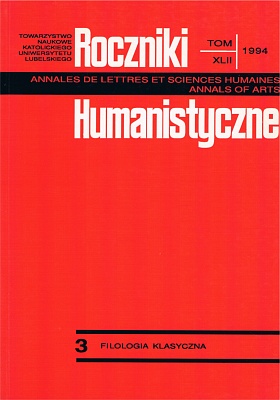Christianization of the Poem Dionysiaká by Nonnos of Panopolis
Abstract
The subject of the article is ”christianization” of the mythological epic Dionysiaká by Nonnos of Panopolis (5th century A. D.), which consists in bold and free creation of poetic compositions by joining ”Christian” and mythological elements. The following elements were ranked among the ”Christian” ones: 1)obvious biblical allusions: the scene of Annunciation to Mary (Luke 1, 26-38) and annunciation to Electra (D 3, 409-444) including Artemis' speech to Aura (D 48, 832-847) and St Matthew's Gospel (1, 23); filling Elizabeth with the Holy Spirit (Luke 1, 39-45) and Semele's ”Bacchic exaltation” (D 8, 27-33); the motif of ”removal of the impediment of the sick man's tongue” by Christ (Mark 7, 35) and by Dionysus (D 26, 288-290); the scene of raising Lasarus from the dead (John 11, 1-44) and returning Ampelos to life (D 12, 142-171 and 217-219); and ”revelation of the promise of the future hope foretold by the deity” (D 46, 363) in the scene with Penteus (D 46, 356-363); 2)St Gregory of Nazianzus' poetical expressions, like e.g. the conclusion of the verse υς μτωρ (Carmina I 1; 9, 40. PG 37, 459), or concluding a verse with the word μτωρ in D 41, 53 and 48, 803; 3)the use of the epithet ϑεητκος earlier conferred on Virgin Mary at the Council of Ephesus in the year 431 in the form ϑεοτκος, to describe Mary's maternity in the Paraphrase of St John's Gospel (P 2, 9 and 66; 19, 135) and in Dionysiaká to describe the maternity of ”the great mother of gods”, also of Rea (D 45, 98), and with respect to water in connection with Aphrodite (D 41, 112).
In the light of the analysis of the ”Christian” elements combined with mythological ones, the proposition that the ”christianization” of the poem Dionysiaká by Nonnos of Panopolis is a purposeful, consciously undertaken, and freely and boldly carried out creative project should be considered as justified. The poem also has its own style with a high literary merit that is expressed in the framework of the epic and mythological convention. This ”christianization” undoubtedly has a literary dimension, and in fact it does not have an inner connection with the Christian doctrine.
Copyright (c) 1994 Roczniki Humanistyczne

This work is licensed under a Creative Commons Attribution-NonCommercial-NoDerivatives 4.0 International License.





